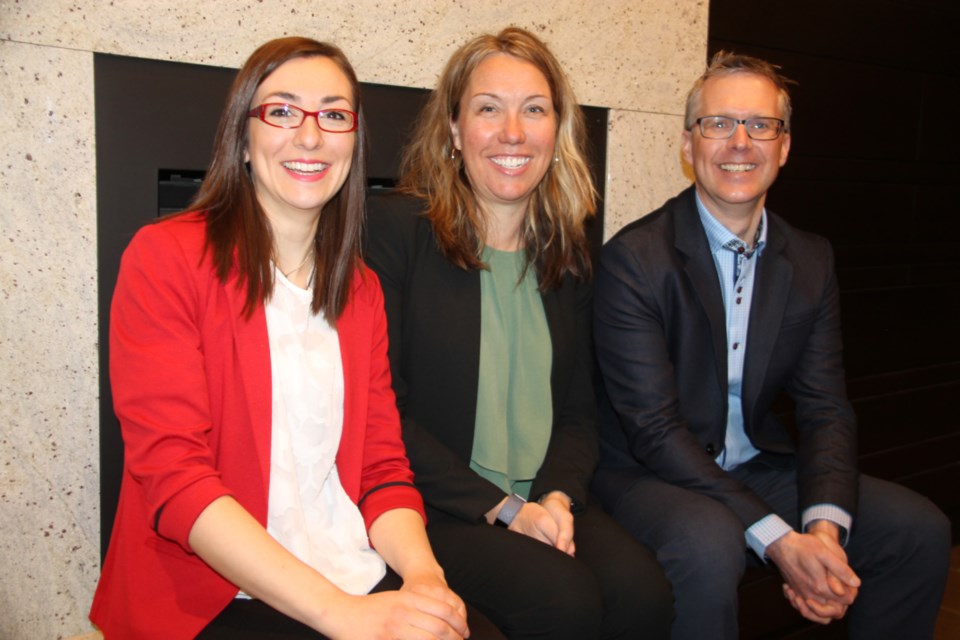At one time, Michelle Schurter worked with children.
Now, the Toronto-based Millennial Strategist CEO is helping companies recruit and retain children who have grown up to be millennials looking for work.
Millennials are generally described as people born between 1980 and 2000.
Today, Schurter said, there are no less than five generations in many workplaces, creating potential communication problems between employees of different ages.
Schurter was the keynote speaker at the Algoma Workforce Investment Corporation (AWIC) Algoma Workforce Planning Summit, held at the Delta Hotel Thursday.
“What I do is try to help business leaders understand the challenges (of having multigenerational workforces),” Schurter said, speaking to SooToday.
“We go through the steps of looking at who are the five generations in the workforce today, and what are the shaping forces behind those generations.”
Those five generations, Schurter said, include traditionalists in their 70s (many people now staying in the workforce longer), baby boomers (people born between 1946 and 1964), those from Generation X (born between 1965 and 1980), millennials and people from Generation Z (people born in 2000 and after).
“We look at what was going on socially, economically and politically when those generations were growing up and how does that show itself at work.”
“We do public speaking or actual training, coaching and consulting, picking up on what are the different communication styles of the generations or preferences for leadership styles, and what it means for a business,” Schurter said.
Among the differences that exist, Schurter said, is the younger generation’s ability to think much more digitally and globally than older workers.
In addition, “Gen Z is saying 50 per cent of them would not take a job, even if their skills align and were offered a job, if their values did not align with what the organization stood for.”
For example, Schurter said a Gen Z individual may not seek employment with a business if he/she felt that business was not sufficiently conscious about factors such as the environment, workplace safety or diversity.
Schurter said Gen Z workers are interested in not only making an income, but also making an impact.
“Businesses may not be thinking about ‘what do we need to do in our culture to make sure everyone’s emotionally safe here?’ It might seem really, really soft, and not a dollar value to it, but there’s a big cost if we get it wrong.”
It’s quite a challenge to unify a workplace with big age differences within its ranks, but success is possible, Schurter said.
“A very simple tip is telling people to get a mentor that’s 15 years younger than you...ask them things like ‘what apps did you put on your phone in the last month, how do you book travel, how do you listen to music?’”
From there, employers can use that information in formulating their business strategies, Schurter said.
“People say to me now, ‘as an employer, I feel I have to ‘sell’ my job (to potential employees). Before, the candidates had to sell themselves to the employer.”
Now, employers should not only list the skills required for the job, but also think about what the candidate will get out of the job as part of their career journey, Schurter said.
Many businesses are having to adapt to the ways of younger people in order to survive.
Schurter said older businesses, such as strawberry farms, which at one time may have had several family members working for them, may now have to consult the younger generation for help, which may include strawberry jam-making classes, music and a craft brewery at events to adapt and stay in business.
“That’s one way to put a ‘gen lens’ on a business, with a new generation coming up.”
As Millennial Strategist CEO and founder, Schurter, a Kitchener native, describes herself as currently being in ‘chapter three’ of her career.
Previously, with an undergraduate degree in child studies and a Master’s degree in social work from the University of Guelph and Wilfrid Laurier University respectively, she worked with children, youth and families.
“I loved it,” Schurter said, having worked in school, hospital and treatment programs.
“Those kids I worked with are what we now call millennials today.”
“That was ‘chapter one’ for me,” said Schurter, who then moved on to work in Halifax in an adolescent day treatment program.
She then moved back to Ontario and earned an MBA from Laurier, working with the city of Kitchener’s downtown development program for ‘chapter two’ of her career.
“For ‘chapter three’ I decided to go out on my own and do consulting and public speaking, and the push for that really came from being in organizations where I was hearing a lot of frustration (regarding multigenerational workforces).”
Along with Schurter’s keynote speech at the AWIC Summit, several panelists discussed employee recruitment and retention.
Panelists included representatives from the F.J. Davey Home, Arauco, Prestige Glass, Avery Construction, Reliable Auto, Future SSM and Immigration, Refugees and Citizenship Canada (IRCC).
